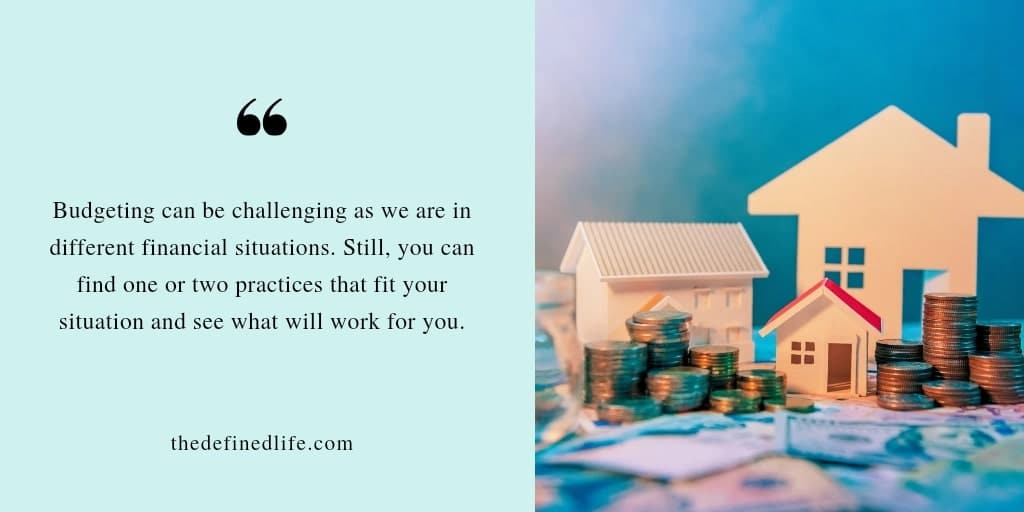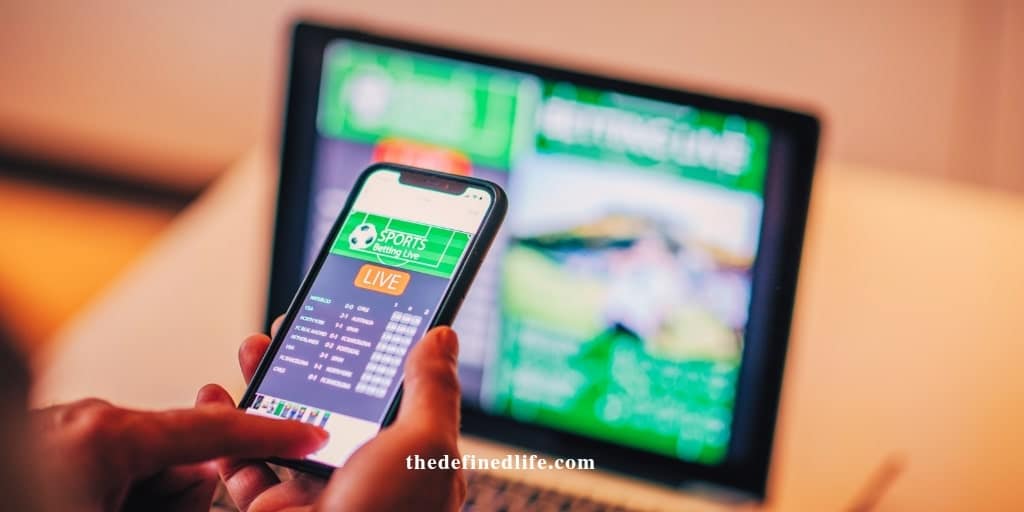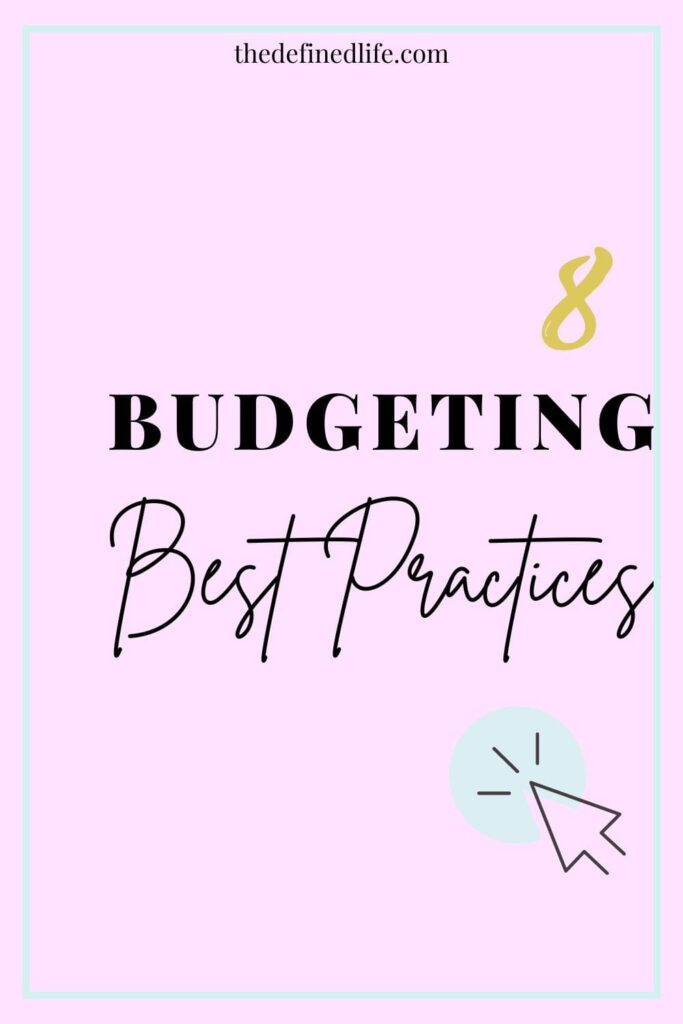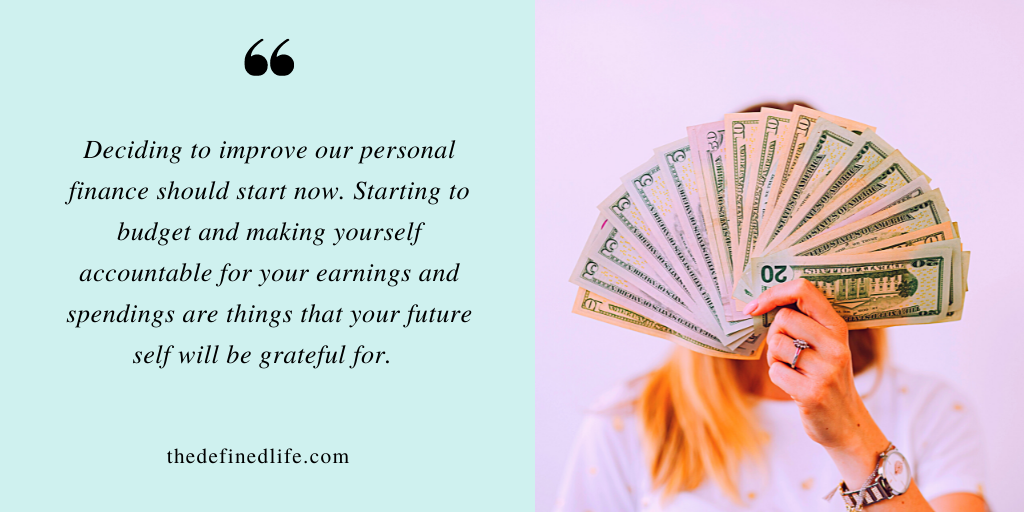
Budgeting is an important aspect of person’s finances. Budgeting shows our income, expenses, savings, or deficit. Although budgeting is important, it is not always easy for everybody to make budgeting a consistent practice.
Thant’s why in this post, I will discuss 8 budgeting best practices you can use now to improve your financial situation and achieve your goals. These practices include tracking your expenses, setting financial goals, prioritizing your spending, using a budgeting app, limiting unnecessary spending, building an emergency fund, automating your savings, and using cash.
Table of Contents
Tracking your expenses
The first step in successful budgeting is identifying and monitoring your expenses. Expense tracking is a way of recording and categorizing your spending. Monitoring your spending means that you are accounting all of your expenses, big or small.
Tracking your expenses is one way to understand better where your earned money is going. Expense tracking will give you an overview of where you are overspending and finding opportunities to cut back.
Knowing that you must write or input your spending in your monitoring tool will make you feel more accountable and careful with your spending habits.
Setting Financial Goals

Setting clear and achievable goals is an underrated budgeting best practice. Your financial plans are essential to guide you in staying within your budget. Having a set financial goal will help significantly in keeping you motivated. Because without clear goals, we will find ourselves aimlessly spending money without thinking about our future.
In other post on how to create a budget with low income, I discussed how it is important to set financial goals- no matter how small they may seem. Examples of financial goals can be saving to buy properties. It can also be to pay off debt, invest in a business or build up an emergency fund.
Prioritizing your spending
Prioritizing your spending is another budgeting best practice. Prioritizing makes sure that you are spending toward the most important needs. Because of this, you will avoid spending beyond your budget and running out of money before your budget period ends.
Here are some ways you can be successful in prioritizing your expenses:
- Basic living expenses include housing, food, utilities, and transportation. These expenses are essential and should be prioritized.
- Set limits on discretionary spending.
- Once you have identified your essential expenses, limit your discretionary spending. This includes things like eating out, entertainment, and shopping.
- Remind yourself of your financial goals. Your financial goals are the way you can successfully prioritize your spending.
- Consider using a cash envelope system to help you stay on track with your spending. Divide your cash into envelopes for each spending category and only use the money in each envelope for that category.
- Regularly review your spending and adjust your priorities as needed. Life circumstances and financial goals can change over time, so it is important to regularly assess and adjust your spending priorities to stay on track.
Using a budgeting app

Most of us use our phones often, and we can use that to organize our finances and stay on top of our budgeting. Downloading a budgeting app can be an easy option in budgeting.
Limit unnecessary spending
Limiting unnecessary spending is another effective way to stick to your budget. However, we must admit that limiting unnecessary spending can sometimes be challenging. These days spending is promoted everywhere, and it is easier than ever to buy because of constant advertisements from social media platforms and countless shopping websites and apps.
We already know that we should not indulge in mindless spending, but exactly why it is crucial. Maybe the following reasons will help you reflect more on its importance in your budget:
- Limiting unnecessary spending helps us in living below our means. Because of this, we can avoid debts and living paycheck to paycheck.
- Limiting unnecessary spending can help you focus on much more important financial needs. It will also help in saving to establish an emergency fund and build up a financial safety net for future unexpected expenditures.
- You can free up more money for savings or investing by cutting back on discretionary spending.
- Limiting unnecessary spending helps you avoid impulse buying. Because you are mindful of your spending, you ensure you only spend your money on essential things and expenses.
Now, the definition of unnecessary spending may differ. But the following are considered the general examples of discretionary expenses and tips on how to avoid or cut back these expenses:
- Dining out- Some people find that they are spending a lot of money eating out. The solution to limit this unnecessary spending is to commit in cooking and eating at home. Some have busy schedules, including us, so it is vital to dedicate a few hours a week to planning and meal prepping.
- Entertainment cost- going out to the movies, concerts, or other events may consume a huge amount of your budget. To cut back on entertainment expenses, you can choose activities that do not require spending much money. Like going to parks, visiting museum, having a game night with friends, or attending community events.
- Subscriptions- Subscribing to streaming services, magazines and other services may seem convenient. Subscriptions may not require huge upfront payment but they can add up easily. To avoid spending much on this expense, consider canceling subscriptions you don’t use or need.
Building an emergency fund

Another important budgeting tip to practice is to have an emergency fund. Unexpected expenses like medical expenses, car repairs, or job loss may happen. Not setting up an emergency fund will most likely lead to borrowings. And borrowing can result in accumulating high-interest debt, making it difficult to recover financially.
With an emergency fund, you are free to make decision that is not solely driven by financial constraints. It provides flexibility in handling unexpected expenses and the ability to seize opportunities or navigate temporary financial difficulties without compromising your long-term goals.
It is advisable to have at least six months’ worth of living expenses to build an emergency fund. Here are ways how to build your fund:
- Determine how much you want to put aside monthly in your emergency fund. Aim for a reasonable amount that will not strain your budget while allowing you to make progress. Because consistency is essential, commit to this savings goal.
- You can simplify your monthly savings by setting up a recurring transfer from your primary bank account to your emergency fund. You will save time and effort by not remembering to make the transfer yourself. Also, you do not have to rely on your memory or willpower because everything is handled automatically.
- Look at how you spend your money and find things you do not need or spend too much on. You can cut back on these expenses for a little while. For example, you can eat out at restaurants less often, cancel or reduce subscriptions for things like movies or games, or find cheaper options for items you use every day. This helps you save more money for your emergency fund.
- Find additional ways to earn money and save more. You can hunt for part-time work, conduct freelance work, or sell online. Any extra money you make can be put into your emergency fund to help it grow faster.
- When you receive unexpected money, such as tax refunds, work bonuses, or cash gifts, try not to spend it all at once. Consider putting part or all that money into your emergency fund instead. This will significantly increase the size of your emergency fund and allow it to grow more quickly.
Automate your Savings
With the use of Internet banking tools, saving money can be automated with ease. Your desired time and amount can be easily arranged. This will help coordinate your savings with the timing of your financial inflows. It is easy to neglect saving a portion of your pay or income if you don’t set up an automatied system.
You can keep yourself motivated and on track with your budgeting and financial goals by automating some of the processes involved in your budgeting.
Using Cash
Using cash to pay for your purchases encourages mindful spending. Cash payments will help you feel a sense of loss as you can see the money leaving your wallet. Although using credit cards can be convenient, it only helps a little with budgeting because you can eventually use it to buy things even if you actually do not have money- aka credits.

Final thoughts on budgeting best practices
Whether you are a beginner or getting into budgeting, these budgeting practices can significantly help. Budgeting can be challenging as we are in different financial situations. Still, you can find one or two practices that fit your situation and see what will work for you.
Regardless, your effort of reading this means you are finding ways to improve your finances and achieve financial freedom.
We can all start small steps at a time!
Love,









Leave a Reply